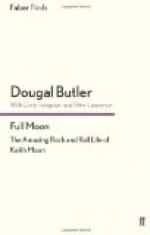“The roouds is rough, and old Garge Crows takes his time,” said the landlord, eyeing Barrant with a heavy stare. “’Tain’t as thow ’e had a passel of passergers to be teeren rownd after.”
“Can you give me some supper while I’m waiting?”
“Sooper?” The innkeeper scratched his chin doubtfully. “’Tis late in the ebenin’ to be getting sooper. There’s nawthing greut in the howse. You could ’ave some tay—p’raps an egg.”
“That will do.”
The innkeeper roared forth a summons, which was answered by a rugged Cornish lass from the kitchen. She cast a doubtful glance on the young man when she learnt what was required, and took him into a small sitting-room, where she left him to gaze at his leisure upon a framed portrait of Cecil Rhodes, a stuffed gannet in a large glass case, and a stuffed badger in a companion case on the other side of the wall. In about twenty minutes she returned with a tray, and placed before the detective a couple of eggs, some bread and butter, saffron cake, and a pot of tea. The eggs were of peculiar mottled exterior, and when tasted had such a strong fish-like flavour as to suggest that they might have been laid by the gannet in its lifetime, and stowed away by a careful Cornish housewife until some stranger chanced to visit that remote spot. Barrant was hungry enough to gulp them down, though with a wry face. He had just finished a second cup of very strong tea when he heard the clatter of a vehicle outside, and the girl thrust a tousled dark head through the door to announce the arrival of Mr. Crows and his wagonette.
Barrant paid for his food and went out. An ancient hooded vehicle filled the narrow way, drawn by a large shaggy horse which turned a gleaming eye on the detective as he emerged, and snorted loudly, as though resenting the prospect of having to drag his additional weight back to the town. The driver sat motionless on the box, watching the caperings of the tipsy tin-miners through the half-open door: a melancholy death’shead of a man, with a preternaturally long white face, and a figure shrouded in a dark cloak, looking as though he might be Death itself, waiting for the carousers to drop dead of apoplexy before carrying them off in his funereal equipage. In reply to Barrant’s question he informed him that the vehicle was destined for Penzance, and immediately the detective entered the dark interior he drove off with disconcerting suddenness, as though he had been waiting for him only, and was determined to make sure of him before he had time to escape.
The shaggy horse lumbered forward at an unwilling trot, like an animal disillusioned with life. Soon they cleared the churchtown and entered the darkness of the moors. A long and tiring day disposed Barrant to slumber. He had begun to nod sleepily when the wagonette stopped with a jerk which shook him into wakefulness. He was able to make out that they had reached the highest elevation of the moors—the cross-roads from where Inspector Dawfield had shown him Flint House in the distance that afternoon. He could just discern the outlines of the wayside cross and the old Druidical monolith, both pointing to the silent heavens in unwonted religious amity.




